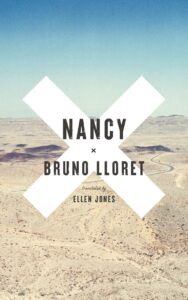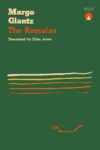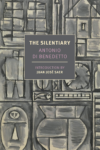
[Two Lines Press; 2021]
Tr. from the Spanish by Ellen Jones
“Knowing you’re going to die is horrible not just because you don’t want to die but because there’s always some residual surviving doubt,” reflects the title character in Nancy, the debut novel by Chilean author Bruno Lloret. From her proverbial deathbed, Nancy tells the story of an adolescence punctuated by violence and grief. As she undergoes cancer treatment in a gloomy port town in northern Chile, Nancy fades in and out of her past. What follows is a brutal exploration of religious fervor, environmental devastation, capitalism, and, inevitably, death. Lloret’s novel is set in the near future and feels both dystopian and yet eerily akin to our contemporary world. In a narrative where time has no real authority and sinister signs prevail, Nancy’s “surviving doubt” pervades Lloret’s language and the reader’s own perceptions of reality.
Nancy’s plot is nonlinear and chaotic. In a morphine-induced haze, our unreliable and darkly comedic narrator looks back on her life growing up in the Chilean port city of Ch — a bleak childhood spent being abused by her mother and ignored by her emotionally absent father.
After her beloved brother Patricio disappears one night outside of a nightclub in a neighboring city, Nancy’s already severed family begins to fall apart. Her mother abandons Nancy for a violent lover while Nancy’s father turns to religion, committing himself to God during the day while slipping out at night to sleep with other men. Spurred into recklessness, Nancy spends her days having secretive sex with a Romany man named Jesulé and escaping to Playa Roja where a group of gringo men film her as they snort cocaine and masturbate. Nancy continues to visit the beach with the men amid reports of local women’s bodies washing up on the shore.
The pattern of abandonment within her family extends to Nancy’s relationships with men. At the same time, her lovers are what ultimately allow Nancy to leave her miserable life in Ch behind. Jesulé takes her in the back of his truck to Bolivia where she hopes to start her new life. There she meets Tim, one of the aforementioned beach bum gringos, and the two marry and move back to Chile, though never returning to Nancy’s hometown. Then the years of solitude set in. When Tim is not out working as an industrial fisherman, he is drinking booze and gambling, leaving Nancy to talk to herself as she awaits his return.
Lloret’s cadence and writing style mirror this isolation; Nancy’s narrative voice has a fluidity to it, as though she is speaking aloud to an audience that may or may not be listening. This is not too far from the truth, since besides the reader, the only other character paying attention to Nancy’s story is a neighbor that is also bed-ridden in the same hospital. But Nancy is not telling her story for anyone else’s benefit. She’s learned the hard way not to put too much of her faith in others, or in God for that matter. Instead, she bears witness to her own life. By retracing her steps back in time, Nancy is able to hold on (though barely) to what she once had, even if that means dissociating from her present self and future possibilities. Nancy uses this tool not just as she is dying, but anytime she needs to escape her current reality. She survives through her memories, reflecting on the past when the current moment is filled with too much suffering. Lloret describes this process in a moment during which Nancy waits for Tim to return to her:
While I waited for him I’d remember nights where I’d stare at the sky for hours on end, lying on the barren earth outside the vacant lot by my house in Ch. I felt closer to everything I saw up there than I did to that idiot.
However, one day when Nancy is well into her cancer treatment, Tim does not come back. Drunk on the job, he is sucked into a tuna processor; his ground flesh becoming the contents of 2500 tin cans. This is just one instance in the novel of horrific violence brought on by the heavy industries that dominate the Chilean economy. In another memorable scene, Nancy watches the smoke fuming out of a meat processing plant nearby Ch as pigs infected with a deadly virus are burned. The citizens of a different town also face illness, devastated by the effects of a coal-fired power plant. Those who are too poor to flee, or “mutants,” suffer from physical deformities. Lloret writes, “You could recognize them from afar by the way they walked, always exhausted, pigeon-chested and shoulders slumping, and to top it off, dry feverish eyes X.”
Contrary to what these otherworldly details might suggest, Nancy is not a science fiction novel. Lloret leans into the uncanny and absurd to illustrate the devastating and very real effects that capitalism and climate change have on everyday Chileans. The desert landscape, like Nancy’s health, is rapidly deteriorating. Furthermore, Ch and its neighboring towns have been forgotten by everyone, save for those who wish to exploit them. Foreign corporations suck the land dry of their raw materials. Meanwhile, there is an influx of gringo tourists, religious missionaries, and film-makers who turn Ch into a movie set and use its locals, like Nancy and her father, as extras. Lloret depicts an impending future filled with oppression and wreckage. Nancy thinks: “If only the world had ended in 2012 like everyone had said it would, that would have been perfect XXXXXXXXXXXX”
Yet Nancy, interspersed with biblical passages and references to the Second Coming, is portentous in its own foreboding way. This is amplified by the presence of Mormons in Ch, specifically the two twenty-something missionaries, Josías and Brian, who manage to convert and baptize Nancy’s father into the church. Wanting to appease her father, Nancy also converts to Mormonism though without much conviction. Instead of seeking guidance from The Book of Mormon, she is much more concerned with looking for omens in her everyday life: The shadows of the clouds on the mountains, the smudges of light in the X-rays of her metastasizing cancer, the rusty machinery sitting dormant in the distance already “fossils of the future.”
Throughout the book, it is not just Nancy that falls victim to the paranoid suspicion that anything somewhat notable might be a sign, a marker of death. As a reader, I found myself getting sucked into the perhaps fruitless though not unsatisfying search to find meaning in Nancy’s world and the strangeness that permeates it, namely Lloret’s use of Xs. The novel (or is it maybe more appropriate to classify it as prose poetry?) is punctuated with bold Xs creating both a visually striking effect on the page as well as modulating the pacing and rhythm of the language. There seems to be an endless amount of explanations for what the Xs might represent. A few I can think of: The looming presence of Nancy’s terminal cancer, the wooden crosses of gravesites in a cemetery (where in one scene Nancy and her father dig up her grandfather’s bones) or concrete poetry. In my own reading, I spent a while scrutinizing a pattern of Xs on the page, trying to decide if they were arranged to represent a bar graph, a reference to Nancy’s father who had just lost his job as an accountant. Maybe a bit of a stretch. In an interview with The Southwest Review Lloret said that he was originally using em dashes to break up the text, then he switched to brackets, and eventually he arrived at the Xs by chance. Of course his initial intention is beside the point, because Nancy is written in such a way that demands an active reading, encouraging the reader to take part in the construction of meaning, and like its characters question whether the explanation they’ve arrived at is even true.
Ellen Jones’ stunning translation reflects the novel’s almost biblical style. She uses simple yet visceral prose to render Lloret’s ominous portrayal of a crumbling landscape ravaged by environmental degradation and poverty. A description of what is found along the beach in Ch reads:
bitches and their pups, empty bottles, old truck tires, debris, dried grass,
ice cream wrappers, textbooks, beer cans, spray paint, disoriented guinea pigs
The minimalistic approach of the writing, similar to the cryptic Xs, might leave much to the imagination, but in doing so it manages to successfully maintain the enigmatic quality of the world it explores. Like the desert, Nancy’s language is fractured and cracked, and there is no predictability in the plot or any familiar narrative structuring to offer respite. Instead the dreams, memories, and images that haunt Nancy at the end of life blend together, sucking the reader into her twisted psyche.
So with frenetic energy, I finished the novel and was left with many questions, though one in particular continued to nag me weeks later. It’s clear that Nancy is a book about death, but could it also be one about hope? Considering the landscape Lloret sketches is decaying, this posit seems unlikely at the onset. But I am consistently drawn back to Nancy’s “surviving doubt” which remains as she clings to what is left of her life. Lloret writes, “It survived in me alright, a fledgling hope, hiding behind the eyes. Even though I was skeletal, mutilated, barren.” At first I considered Nancy’s storytelling to be the hopeful element; the fact that Nancy chooses creation while her own life and the world around her seem to be ending. However, everything else about the novel subverts conventional narrative structure. It doesn’t construct a meaningful or legible narrative out of Nancy’s life. Maybe that’s the point: Hope lies in our uncertainty (or doubt). In what is yet to come. Whether for Nancy that is the Second Coming, her death, or the prospect of evading both, through doubting she keeps all of these potential futures alive. Nancy maintains her belief in the existence of another world, a better one, which endures despite the destruction of that around her.
Rose Bialer writes and teaches in Madrid, Spain. Her writing can be found in the Kenyon Review Online and LibroMobile Voices.
This post may contain affiliate links.







